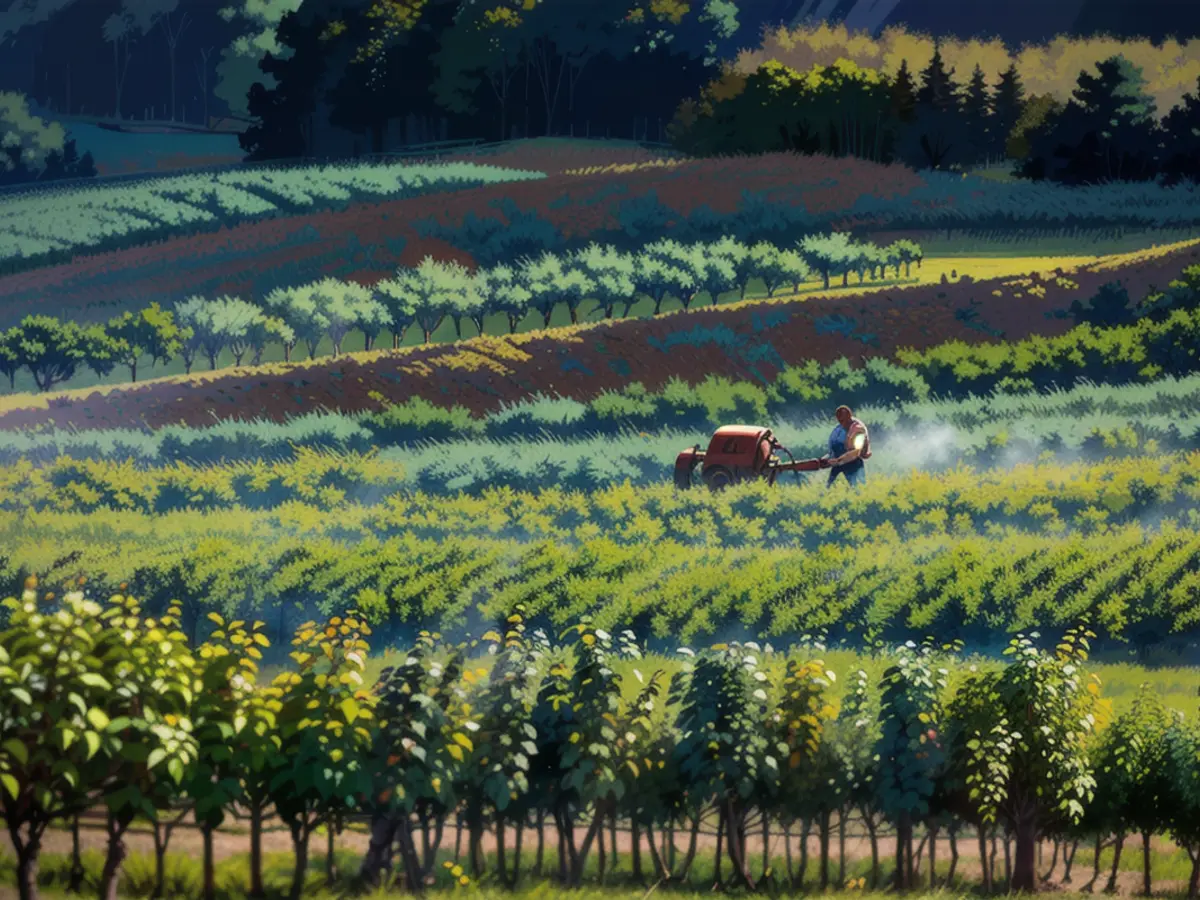Farming Sector - Rainfall issues for vineyard owners: Fungi pose a threat to crop health
Excessive rainfall has been an issue for winemakers in the southwest, with pest control concerns arising due to potential long-term fungal diseases such as false mildew. The Managing Director of the Baden Winegrowers Association, Holger Klein, expressed his concerns, stating, "The constant moisture is not ideal."
Peter Albrecht, the Vice President of the Winegrowers Association of Württemberg, shared similar sentiments about the potential threat of false mildew, warning that "this could become a problem if the weather continues like this." However, an immediate danger to the Württemberg region is not yet present.
Both false and true mildew, along with gray mold, are regarded as the leading pests of vineyards. Traditional winegrowing methods involve frequent spraying of plants with protective agents to maintain grape health. New "Piwi" grape varieties, with increased disease resistance, require less of these treatments.
Stefan Huschle, of the Freiherr von und zu Franckenstein winery in Offenburg, believes that the rainfall actually benefits the industry. He explains, "There are now sufficient groundwater reserves again." Frost damage has occurred in vineyards within the regions of Ortenau and others, though the consequences are highly variable and challenging to evaluate.
In the past, the Winegrowers Association of Württemberg estimated that up to 50% of their vineyards have been affected by frost incidents. These frosts occurred most recently at the end of April, following a period of relatively warm temperatures that led to premature budding across many areas.
Baden and Württemberg are the third and fourth largest winegrowing regions in Germany, respectively, surpassed only by Rheinhessen and Palatinate.
Read also:
- Tough return to normality in snow and ice
- Fewer unauthorized entries: Domino effect through controls
- Trial against BND employee from mid-December
- Xhaka leads Leverkusen to triumph in cup tournament, scoring two goals.
- The fungal infestation due to excessive rainfall in the southwest has become a significant concern for vineyard owners, threatening crop health with potential long-term diseases like false mildew.
- Holger Klein, the Managing Director of the Baden Winegrowers Association, emphasized that the constant moisture from the rain is not optimal for grapevines, posing pest control issues.
- In response to the fungal infestation, winemakers in the Fribourg region of Switzerland have implemented plant protection measures, including regular spraying of protective agents to safeguard their vineyards from diseases like false mildew.
- Recently, Germany's Baden-Württemberg and Württemberg wine regions, known for their high-quality wine, have experienced a surge in fungal diseases due to extreme weather conditions, impacting their crop yields and causing concerns among local agricultural experts, such as Peter Albrecht.
- According to Albrecht, the Vice President of the Winegrowers Association of Württemberg, the potential growth of false mildew could become a serious issue for vineyards if the current weather patterns persist, leading to substantial crop losses.
- The agricultural sector in Weinsberg, Baden-Württemberg, has been affected by heavy rainfall, causing both crop damage and issues related to plant protection, as rain has facilitated the spread of fungal infestations, leading to a decline in grape quality.
- Experts in the field of viticulture, including Franz Keller from the Keller Estate, have called for farmer-led collaboration to address these weather challenges, focusing on sustainable farming practices and innovative plant protection solutions, such as the use of indigenous plant cover crops, which promote biodiversity and contribute to preventing fungal infestations.
Source:








